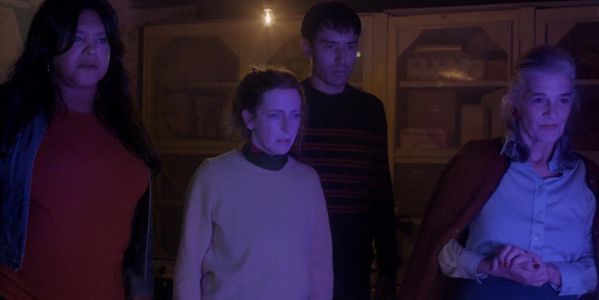NewFest LGBTQ 2019 Final Report

Andrew Stover is a film critic/writer from the Chicagoland. His…
The following four films premiered at the 31st Annual New York LGBTQ Film Festival on October 26, 28 and 29: A Night at Switch n’ Play, Brief Story from the Green Planet, Scream, Queen! My Nightmare on Elm Street & Tu Me Manques.
A Night at Switch n’ Play (Cody Stickels)

The defiant, empowering art of drag is meant for those to express their gender identities through performance. Dressed in expressive battle armor, the individuals disguise themselves as a feisty alter-ego, or personality, earnestly unveiling their performative voice and inner identity. It can make the individuals feel more sexy, powerful or dominant; the performer has full control over how they communicate themselves. Scarcely reaching beyond the 60-minute mark, director Cody Stickels’ documentary, A Night at Switch n’ Play, captures a usual evening at the Branded Saloon in Prospect Heights, where the fierce drag group repeatedly performs without any limitations.
The introduction to these daring participants is rather rudimentary, typically borrowing from the reality show template. An act is followed by an interview, where the participant will discuss their on-stage persona and how it makes them feel. Their poses, emotions and fervor are laudably charged. Unfortunately, the scene transitions or camera maneuvers between performers aren’t as dazzling: The doc’s fused with unwavering camerawork that doesn’t view the subject or the audience in any stimulating positions, and the bland non-diegetic music doesn’t outline the vehemence of the subject. Those elements aside, the drag queens here convey so much fearless passion and rich, many-hued demeanor.
Hosted by Miss Malice (she/her), a high-fem performer (“FeMC”), this drag show spotlights drag performers who boldly radiate their non-conforming frame, and they perform purposeful works that highlight their identity as well as the wobbly constructs of virility and femininity. Pearl Harbor (they/them) filtrates sexuality through a non-binary production with the track of Radiohead’s Creep blaring in the background. Pearl Harbor’s act exhibits how non-binary people exist, and binary drag queens can exist. Divina GranSparkle (she/her) puts on a performance that balances abnormal and fanciful ingredients (for instance, making a Twinkie ejaculate). K. James (he/him) conserves a manly comportment. Zoe Ziegfled (she/her/they/them) keeps her body hair intact, altering the pristine image of female desirability (she inherits a burlesque quality: “what it means to be a gender, what it means to be a body”). Vigor Mortis (he/him) maintains a lightly formidable presence that’s still fairly vulnerable. Nyx Nocturne (they/them) indulges a much more morbid posture, “absolute delight and absolute terror” is how they gently describes it.
A Night at Switch n’ Play really does feel like an unforgettable night at Switch n’ Play. You become part of the audience, whose ear-splitting cheers and uproarious applause foster an aura of acceptance and empowerment. Everyone is accepted here, and the variety of drag queens get to demonstrate what they need to say through impassioned, and appropriately dissimilar performance. Their preferred pronouns, their preferred attitude, their preferred identity, all of their distinct attributes bring something electrifying to the stage.
The documentary doesn’t wholly explore the performers’ lives beyond the make-up, or beyond the context of their drag character. And because the background of how they found their voice through drag is left ill-defined, or encapsulated in a two-minute interview, there isn’t much emotional profundity as one would hope. Despite the simple design of Stickels’ documentary, the depiction of these diverse, spunky and nonconformist group of voices bring more confidence and sincerity to the drag scene, with no barriers obviating what is a devout and inspired celebration of oneself.
A Night at Switch n’ Play had its NY premiere at the 31st Annual New York LGBTQ Film Festival.
Brief Story from the Green Planet (Santiago Loza)

Clocking in under 80 minutes, Santiago Loza’s (an Argentine filmmaker known for Malambo, The Good Man) otherworldly LGBTQ-inspired quest is ultra-weird and semi-complete. Brief Story from the Green Planet is a softly paced drama that nourishes a faintly uncertain tone and offbeat narrative. Eerily quiet and intrinsically gorgeous and bold, Loza’s adventure isn’t laced in Hollywood razzle-dazzle; instead, it embraces a keen eccentricity that voices empathy for its protagonists, which just so happens to include a big-eyed, miniature alien who never speaks. Let me elaborate a bit.
We’re introduced to self-reliant trans woman Tania (Romina Escobar) and her friends Pedro (Luis Soda) and Daniela (Paula Grinszpan), as they’re just about waking up in pallid apartments, located in Buenos Aires. We soon learn Tania is trying to avoid men at the moment, Daniela just got out of a dysfunctional relationship, and Pedro seems unusually composed and bushed — but if Pedro’s given the space and poppy music to dance the night away, he’s let loose. The first twenty minutes captures this alienated trio in a principally non-vocal fashion, meshing mysterious piano music with graceful camera movements (which measurably zoom out to depict their decrepit setting) to add that coat of quirkiness early on. After a predominantly wordless introduction, which also spotlights Tania and Pedro dancing at a local queer club with techno music blaring in the background, a phone call halts all flashy lights and music.
Tania’s grandmother has passed away, so Tania must travel upcountry to settle her affairs, and Pedro and Daniela accompany her there for emotional support. Guided through the house by her grandmother’s caregiver, it’s revealed that Tania’s grandmother met and protected a bug-eyed alien, who is now in a deep sleep or some kind of coma in the basement freezer. For years, her grandmother would bathe and feed the alien, until it began getting homesick. Her grandmother’s last wishes were that Tania transport the little guy back to where she found him. And that’s why Tania, Pedro and Daniela venture through labyrinthine woodlands and vacant highways, following the path Tania’s grandmother has laid out so rigorously on a crumpled up map.
Brief Story from the Green Planet is a fleeting journey that never arrives at a definite destination; it does, however, latches onto thematic value: the search for haven. And it’s all the better for it. The dialogue is scarce, the elegant camerawork paints an image of the characters without drawing any hasty conclusions, and the piano-infused score toes the line of being ominous and melancholically beautiful. Steadily following Tania as she explores her grandmother’s house, piecing together fragments of the past with so much joy, the grandmother’s caregiver casually divulges a secret alien gran looked after. Not overly stunned, the trio agrees to haul the little alien in a suitcase packed with ice to the exact spot he came from.
Making a few pitstops along the way, particularly for more ice, there aren’t many physically demanding obstacles the group of friends has to overcome. Other than the usual hunger, thirst and gelid outdoors, there aren’t any scenes of vicious animals or barbaric intruders (from and not from this world) tempted to afflict pain. There are, however, local citizens who stare daggers at the group of friends, but hardly any bigotry-inspired violence befalls. Daniela also tends to see visions of alien or native-like figures, and they passively show them the way. Instead of exploiting the characters’ situation, Loza’s picture is compassionate and inspiring. Through smoky grey hues and dramatic wide shots, cinematographer Eduardo Crespo delineates the journey in all of its aching tranquility.
Despite her pain being left unspoken, Tania’s energy is slowly being drained along the journey, implying her transition has not been a painless endeavor. The absence of intolerance in their upcountry escapade doesn’t mean Tania or Pedro hasn’t endured their fair share of it already. The verbal and physical disdain may have ceased (at least from what is shown of their lives), but the scars left behind may have persisted on with pernicious infection, and it’s causing Tania to lose faith in society. Romina Escobar’s performance as Tania is outwardly driven, but she’s also properly fitted with brittle smiles and underlying sadness and self-doubt, underscoring the metaphorical significance of the conclusion. Luis Soda’s Pedro is decidedly infectious, inheriting an introverted personality, but letting himself move to the music with agility. Paula Grinszpan’s Daniela is patently reserved, but when necessary, alleviates any foreseeable hurdle. This tight-knit group doesn’t often interact in persiflage like other best friends might do, but it’s really how they comfort each other, support each other during their journey that garnishes the picture with hues of intimacy.
Brief Story from the Green Planet can be dissected in various methods, but one conclusive statement made in this hour-long road trip film is the search for refuge in a hard-bitten society. As disheartening as it is, LGBTQ individuals are still being anathematized by those who don’t inherit an empathetic heart. At one point, Pedro says, “We’re all a bit odd.” But just because you’re configured differently doesn’t mean you should be treated unfairly. Then again, Santiago Loza’s peculiar drama also has a small bug-eyed alien, hallucinatory elements and emblematic moments of silence.
“We’re going to show you something really odd,” makes sense in the context of the movie, as Pedro opens the suitcase to reveal an alien to a suspicious doctor, but it also sounds an awful lot like the filmmaker’s statement. But I’ll argue there’s something deeply candid and sincere about Santiago Loza’s gentle, delightfully zany approach to seek out that one place where everyone can feel accepted — in this case, it’s not on Earth. We can only hope that one day Earth will become a sanctuary of love, all customs and polarities aside.
Brief Story from the Green Planet premiered at the 31st Annual New York LGBTQ Film Festival on October 28, 2019.
Scream, Queen! My Nightmare on Elm Street (Roman Chimienti, Tyler Jensen)

Scream, Queen! takes its dual-meaning title from the classic horror platitude of the scream queen, an expression used to describe the final woman to survive long enough to confront the knife-wielding or ax-swinging murderer in a slasher flick. But was there ever a male scream queen? Before 1985’s A Nightmare on Elm Street 2: Freddy’s Revenge (which was the anticipated sequel to the 1984 slasher hit), no there wasn’t. But Mark Patton, a 25-year-old aspiring actor is about to get his big break as the leading role in A Nightmare on Elm Street 2 as the dreamy Jesse Walsh, a character being possessed by the iconic Freddy Krueger (Robert Englund). The sequel showcases more inflated violence and screams of terror, but the true terror lies behind-the-scenes.
Patton’s career seemed to prosper as the box office numbers for Freddy’s Revenge proliferated in numbers, but his career came to a sudden halt as news outlets began uncloaking a gay subtext that’s ingrained in Nightmare 2. Directors Roman Chimienti and Tyler Jensen document Patton’s brisk rise to stardom, succeeding departure from the spotlight, and consequent retrieval of his queer cult status. I can only imagine what it’s like to be a 25-year-old aspiring actor to get a gig of a lifetime, only to be forced out of the movie business because of public stricture and Hollywood’s homophobia (and the ubiquitous fear of AIDS).
Patton was a progressive on-screen character back in the ’80s, but that was during an era where homosexuality was painted in a negative image, largely due to the fact of the AIDS crisis. So Patton did what many gay men did, went into hiding; but Patton didn’t just stay situated in the closet, he fled to Mexico, finding comfort out of the public’s eye. Scream, Queen! My Nightmare on Elm Street is a compelling documentary that pinpoints Patton’s short-lived career as an actor, and his story is a requisite reminder of how far we’ve come in the fray for gay impartiality. Unfortunately, for Patton, in the ill-informed ’80s, he contracted HIV from his then-boyfriend, Timothy Patrick Murphy, who passed away momentarily thereafter. Thankfully, he got through it, but the public’s newfound criticism of Nightmare 2’s gay subtext and the perplexing outbreak of AIDS drove him into hiding.
Capturing the scrutiny of LGBTQ horror fans, filmmakers, professors and historians, Scream, Queen! My Nightmare on Elm Street examines Patton’s experiences, and how the initially panned horror movie became a cult classic. The cult favorite is commonly held dear by LGBTQ horror fans, who were able to cognize the gay subtext, and potentially expand this silly little slasher picture into a vivid portrait of the monster within — in this instance, the monster is outwardly Freddy Krueger but inwardly homosexuality. Kreuger is the embodiment of the character’s masked homosexuality, and the lead character is trying to silence this monster inside him, but the monster’s implacable and acrid, unwilling to be silenced.
Nightmare 2 is radical in ways, ahead of its time by evidently promoting a boy scream queen, without Patton really knowing and screenwriter David Chaskin denying the belief that he purposefully incorporated the gay subtext. But at one point, an older interview shows Chaskin admitting the gay subtext was indeed preplanned, but “was intended to play homophobic rather than homoerotic.” For decades to come, Patton held a pernicious grudge against Chaskin for invalidating the gay subtext, and essentially putting all of the blame on Patton’s flamboyance. This grueling frustration and unhealthy anger hurl Patton to confront Chaskin in a gripping modern-day interview.
Scream, Queen! My Nightmare on Elm Street arranges footage of Patton attending horror conventions and signing autographs for devoted fans of Nightmare 2, while also allowing a nugget of film theory to creep its way in. The discourse of Hollywood’s homophobia back in the day is seen through the painful eyes of Mark Patton, a gay actor who went into hiding, until realizing he became a beloved gay icon amongst queer audiences. In this satisfactorily shot and structured doc, Patton gets the final word.
Scream, Queen! My Nightmare on Elm Street premiered at the 31st Annual New York LGBTQ Film Festival on October 28, 2019.
Tu Me Manques (Rodrigo Bellott)

Being who you are isn’t always easy. To speak your truth, only having your parent(s) reject you for being you, is a markedly misguided parental decision; if anything, the parents don’t feel like they have any other choice because of their faith and the pious community they’re entangled in. Little do they know parental rejection unites the LGBTQ community in some cases. Dismissal and hatred of any kind bring LGBTQ folk together as one vociferous, amalgamated voice. In Tu Me Manques, writer-director Rodrigo Bellott adapts his own play into a feature-length film, bringing Tu Me Manques to life in all of its heartbreaking veracity. Laying out an ample thematic playground, Tu Me Manques is a weighty drama exploring loss, redemption, but more importantly, the aching desire to know what your loved ones are thinking, when they uphold a facade with a glistening smile or, in this case, specious divinity.
“Tu Me Manques” is a French phrase meaning “I miss you”, a fitting title that encapsulates Jorge (Oscar Martínez) and Sebastian’s (Fernando Barbosa) dejected feelings of Gabriel’s death. Gabriel was a closeted Bolivian man who fell in love with another Bolivian man named Sebastian in New York. When his hidebound family became aware of his homosexuality, Gabriel chose suicide, a woefully common solution that cannot be undone. Jorge is a homophobic, fuming and well-heeled businessman from Bolivia, who first meets his deceased son’s boyfriend over an inadvertent video chat. Sebastian is unaware that his partner took his own life, and during the accidental video chat, he’s confronted by Jorge’s unimpeded bile — which is basically a homophobic rant blaming Sebastian for Gabriel’s death.
You would think Jorge and Sebastian would never cross paths, but a father’s love for his child leads back to the one place where his son felt the most “conflicted”. Jorge travels to New York to look for answers and learn about his son he thought he knew. As Sebastian introduces him to a world full of people he has always blindly derided, and when he learns about a play Sebastian is directing about Gabriel’s tribulation, Jorge’s viewpoint on life alters and he gradually grows closer to his son.
The picture arranges flashbacks of Gabriel and Sebastian’s valued relationship and flash-forwards of Sebastian talking to a reporter. In modern-day, Sebastian guides Jorge through a world he’s unfamiliar with. The scattered narrative structure is surprisingly lucid and reasoned. Watching Sebastian and Gabriel’s relationship from the beginning to their final moments, enhances Gabriel’s imminent death, something which Sebastian had no knowledge of or any opportunity to hinder when he supported Gabriel’s plans to return to Bolivia. Their relationship is typified by moments of pure bliss, blurring out the hardship, potentially because this is how Sebastian wants to remember it. Noah Greenberg’s (Lizzie) cinematography is measured greatly in close-up shots of bodies, utilizing the human physique not in sexual manner, but in a manner that exudes the significance of physical intimacy and how freeing it can be to break out of one’s shell. The free-flowing camerawork performs with such fluency as if the camera is another character on stage.
Fernando Barbosa gives a sympathetic performance as Sebastian, portraying Gabriel’s heartbroken partner with palpable tears, gloom-ridden eyes and graceful demeanor. When Gabriel was alive, Sebastian brought out the best of him and offered his heart and an arm to lay on. The first reactions with Jorge were rather virulent, but Sebastian never relied on violence to solve his problems with Jorge’s bigotry. And Oscar Martínez’s emotionally involved performance as Jorge is the highlight of the movie. Watching Jorge’s boundaries crumble out of existence as he begins managing his grief and communicating new forms of virility, happens to be vastly optimistic. It evinces hope that if Jorge can change, others in Bolivia can change.
Tu Me Manques is based on a play, and as we all know, plays are generally more histrionic. Despite the solemn subject matter, Tu Me Manques toes the line of being slight and heavy-handed. Sebastian’s friends, including the animated Alonso (a fabulous Dominic Colon), exercise comical dialogue, which suits the picture. What doesn’t always suit the film is the dialogue, and how most side characters seem to verbally spill out their feelings without much cogency; it feels like they’re reading a script. On another hand, the face-to-face conversations between Jorge and Sebastian are where the emotion is most valid, and where the stakes are thoroughly drawn with piercing effect.
Tu Me Manques juggles the topics of loss, grief, regret and admitting you really don’t know your loved ones, and does so in a fashion that’s still reasonably dolorous and unfeigned. At one point, Sebastian says, “We can’t afford to be afraid.” And despite the theatrical vim, which doesn’t always translate well to the silver screen, Rodrigo Bellott isn’t afraid to tell this story in another medium — hopefully reaching those who were victims of parental neglect, or parents who will learn to love their own child after spending time apart, knowing they can die at any moment with words going unsaid.
Tu Me Manques premiered at the 31st Annual New York LGBTQ Film Festival on October 29, 2019, as the Closing Night feature.
Did you attend NewFest 2019 at all? Have you seen any of these films? Let us know in the comments!
NewFest 2019 ended on October 29, 2019, with Tu Me Manques.
Does content like this matter to you?
Become a Member and support film journalism. Unlock access to all of Film Inquiry`s great articles. Join a community of like-minded readers who are passionate about cinema - get access to our private members Network, give back to independent filmmakers, and more.
Andrew Stover is a film critic/writer from the Chicagoland. His film & TV reviews can be found on Film Inquiry & Film Threat.













